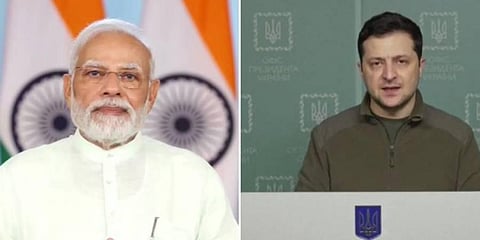

NEW DELHI: It has been a year since the conflict broke out in Ukraine which triggered not just a humanitarian crisis but also led to a shortage of food and fuel and divided the world between Ukraine and Russia.
India has been in the news since the outbreak of the conflict – not just for maintaining its own stand on the conflict, but for balancing its position by sending humanitarian aid to Ukraine and increasing oil imports from Russia. India also outlined its take on the conflict and didn’t speak against Russia. Prime Minister Narendra Modi's phrase 'this is no era for war' became a part of the joint statement of the G20 Summit held in Bali in 2022.
Let's look back at the year it has been since February 24th, 2022. When the conflict broke out, India had the humungous task of evacuating 22,000 Indian students who were studying across Universities in Ukraine. Ministers and diplomats were aligned and sent for the evacuation process from bordering states of Ukraine – Poland, Hungary.
All but one student – who got hit by shrapnel and died – returned to India.
As Russia began to get isolated by the world, India began to increase its oil imports from Russia as crude was available at a discount. From a mere 2 per of its total imports, India today imports close to 30 per cent of its crude requirement from them. Despite the sanctions imposed on Russia and the cap on the price of crude that was imposed by G7.
India also extended humanitarian aid to Ukraine thereby maintaining a balance.
India also managed to strike a deal with many nations including Russia, Sri Lanka, Bangladesh, UAE and a few nations in Africa to trade in local currencies.
Prime Minister, Narendra Modi, made repeated calls to Russian President, Vladimir Putin and Ukrainian President Vlodomyr Zelensky to resolve the conflict through dialogue and discussion.
In the UN too India abstained from all votes against Russia. This move didn't go down well with the US and Europe.
Reacting to the posturing the West had against Ukraine and India’s stand, External Affairs Minister, Dr S Jaishankar, during the Globesec conference in Bratislava (5th June, 2022) said, "Somewhere Europe has to grow out of the mindset that Europe’s problems are the world’s problems but the world's problems are not Europe’s problems.’’
Dr Jaishankar said that the world was oblivious to the challenges India faced in the neighbourhood and expected India to challenge its long-term ally Russia in the wake of the conflict.
Meanwhile, the US began to reaffirm that India was a strategic partner and they were partners in the Indo-Pacific. The posturing was also to strengthen their position against China – with who the US has been at loggerheads over Taiwan.
The leaders of the West, despite vehemently opposing Russia, came to terms with India’s stand on Russia.
Prime Minister Modi’s comment 'that this is no era for war' was included in the joint statement of the Bali Summit in 2022.
India is hosting the G20 Presidency this year and within a week’s time will host the Foreign Ministers meet. Russian Foreign Minister, Sergey Lavrov and US Secretary of State Anthony Blinken are both expected to attend the meeting.
With the way India has handled things in the past year, it is almost certain that they will continue to do the balancing act even on home turf.